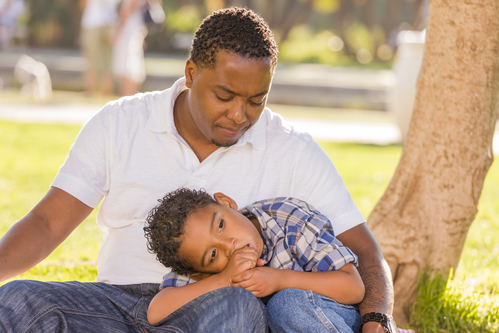 Divorce is one of the hardest things a family can go through. Children are particularly susceptible to the tensions, range of emotions, and changes that come with a divorce. However, children are often affected more by the way the divorce is handled than the divorce itself. You and your former spouse can be a strong support for your children and provide them with the love and reassurance they need during this difficult time—but how can you do this?
Divorce is one of the hardest things a family can go through. Children are particularly susceptible to the tensions, range of emotions, and changes that come with a divorce. However, children are often affected more by the way the divorce is handled than the divorce itself. You and your former spouse can be a strong support for your children and provide them with the love and reassurance they need during this difficult time—but how can you do this?
5 ways to support your children in a divorce
-
Listen to Your Children During a Divorce
Your children are going to have many different thoughts and feelings about you and your partner’s decision to separate. One of the most important things you can do during this time is simply listen to your children. Let them know you hear their feelings and that their feelings are valid. Encourage them to voice their feelings, and talk with your children—let them know that it’s perfectly ok to be feeling as they are.
You can and should also encourage kids to have an ongoing discussion with you about their thoughts and emotions regarding the divorce; however, don’t look to them to initiate the conversation. Your child is likely feeling confused, angry, and hurt, so it’s important that you check in with them to ask how they are feeling. You may also consider the services of a family therapist or a children’s therapist to help during this time.
-
Keep a Routine During Divorce
In this time of change, a routine can be very comforting to your children. It helps them to understand that while certain things are going to be different and new, other things will stay the same and be familiar. Be candid about what’s happening and how things will change, but also emphasize what things will stay the same. For instance, both parents will still take care of them, but maybe Mom will be driving them to soccer practice instead of Dad from now on.
No matter how tempting it may be, it’s important to not “spoil” kids by letting them break the rules. Rules help establish a normal routine and expectations, ones that your child is familiar with and can manage. Communicate with your ex to try to ensure their routine and rules will stay the same—consistency will help reassure your child as new changes are taking place!
-
Encourage Time with the Other Parent During a Divorce
Depending on how the judge decides custody should be shared, one parent may have more time with the children than the other. It can be difficult to encourage your children to spend time with the non-custodial parent (the parent without primary custody), especially if you and your former spouse are not on good terms.
However, being supportive of your child’s visits with your ex can make a big difference in helping your child to cope with the divorce. Smiling when they leave to spend time with your ex lets them know you’re pleased they’re spending time together. When they return, be interested in what they did during their visits, but keep the focus on your child. Questions like, “Did you have fun with Daddy?” are better than, “Who was Daddy talking to on the phone?” Let your children know you want your ex to be a part of their lives just as much as they do.
-
Never Fight in Front of the Kids
Although divorces aren’t always amicable, it’s crucial that you keep the arguments, legal discussions, and conflict away from your children. Do your best to not blame your ex, talk bad about him or her in front of the kids, say it was all their fault, or fight about the children in front of the children. Being exposed to the conflict can reaffirm your children’s belief that the divorce was a result of something they did.
Supporting yourself is often just as important as supporting your children so that you don’t lean on your kids for support. Your children are not your friends, so any negative comments or frustrations concerning your ex should be saved for a therapist or a friend. Make sure you never discuss adult problems with a child. By keeping you and your ex’s conflict away from the children, you can be more supportive parents for your child.
-
Emphasize That the Divorce Is Not Their Fault
This is perhaps the most important thing you can do to support your children during the divorce—let each of your children know that in no way was the divorce a result of anything they’ve done.
When you break the news of the divorce to your children, both parents should tell all the kids together and be prepared to answer questions. Kids tend to think everything is about them, but it’s your job to reassure them that it’s not their fault. Children may think that something they said or did has caused their parents to separate. Emphasizing that the divorce is not their fault is important throughout this time.
Recognizing the signs of stress in children is also essential during your divorce. Younger children may be fearful of the coming changes and regress to old behaviors. Older children may act out in the form of behavioral problems at school or home. Some children even have headaches or trouble sleeping, emotional instability, and may be irritable. Notice any changes in your children and offer support!
Ease the Transition During a Divorce
Knowing how to support your children during a divorce can help ease the transition for everyone involved. Children need to know that both parents will continue to love and support them throughout the separation and throughout their lives. Listen to your children, even if what they have to say is difficult for you to hear. Keeping a routine can help to establish normalcy and be reassuring.
By keeping the conflict with your ex private and being supportive of your children’s time with your former spouse, you can make this big change in their lives a little easier. Remember to always tell your children that the divorce is not about them, nor was it their fault—and that you will love and care for them no matter what!



